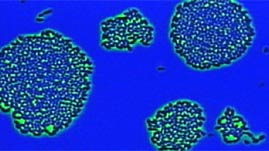Siberia once seemed impossibly remote. Not anymore. A drug-resistant strain of tuberculosis (TB) from a Siberian prison has now been tracked to New York City. Using DNA fingerprints, microbiologists at the Public Health Research Institute in New York City have identified more than 12,000 different strains of TB from all over the world and are using this information to track the evolution of TB and its spread worldwide. But the strain they recently found in New York is different. It is one of the multi-drug-resistant strains from Russia that is very difficult to treat. Russian prisons have become breeding grounds for new multi-drug-resistant strains of TB because of crowded conditions, the use of low-quality antibiotics, and inadequate follow-up treatment for prisoners. At least 30,000 Russian inmates now have multi-drug-resistant TB.
A disease that had once been considered readily curable, TB has become a considerable foe. TB is on the rise worldwide and now rivals AIDS in the number of lives it claims -- between 2 and 3 million each year. That's why microbiologists Barry Kreiswirth and Alex Goldfarb of the Public Health Research Institute are focusing on Russian prisons. Kreiswirth says, "What's dramatically affected the spread of TB is our ability to travel. All the strains that are in the Russian prisons will eventually come to our doorstep." To meet this challenge head-on, Goldfarb has developed a pilot program in the Siberian prison system to change the way that TB is treated, with the hope of preventing the evolution and spread of additional strains of multi-drug-resistant TB.
TB is only the tip of the iceberg. Use and misuse of antibiotics, especially in the United States, has spurred the evolution of drug-resistant forms of pneumonia, gonorrhea, and other infectious diseases. Kreiswirth laments, "We've created this problem. Multi-drug resistance is a manmade problem.... By developing as many antibiotics as we have over the last 50 years, we've essentially accelerated an evolutionary process. The outcome is that we're going to have more drug-resistant microbes to the point where some of the most dangerous bacteria will not be treatable. We're racing against the microbe every day, and unfortunately we're losing."


 Loading Standards
Loading Standards Teachers' Domain is proud to be a Pathways portal to the National Science Digital Library.
Teachers' Domain is proud to be a Pathways portal to the National Science Digital Library.
